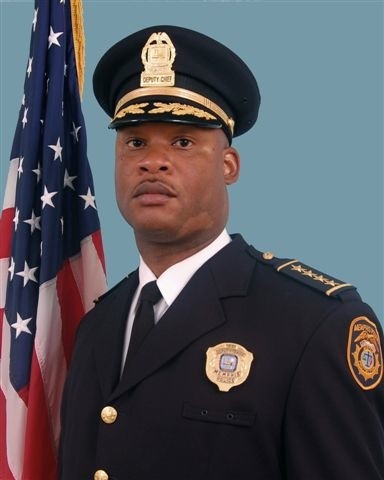Here’s the long version of a Q&A with new Memphis Police director Toney Armstrong that ran in this week’s Memphis Flyer.
He may be best known for extracting a confession from convicted murderer Jessie Dotson in 2008’s Lester Street murder case on A&E’s The First 48. But new Memphis Police director Toney Armstrong has accomplished plenty more outside the reality show’s spotlight.
The Memphis native began his career in the U.S. Army, but he joined the Memphis Police Department (MPD) in 1989 a few years after his honorable discharge. Armstrong made his way through the ranks working undercover and leading in the robbery bureau, the organized crime unit, uniform patrol, missing persons, CrimeStoppers, and the homicide unit. On April 15th, Armstrong was sworn in to lead the department following former director Larry Godwin’s retirement.
The child of a single mother from inner city Memphis, Armstrong says he’ll make community policing his number one focus, allowing technology-driven policing to take on a supporting, rather than starring, role. — Bianca Phillips
You’ve stated that you’re a proponent of community policing, but how is that different from the way the MPD currently operates?
Right now, a lot of what the department does is technology-based. We rely on technology to tell us where to deploy personnel and to tell us what kind of crimes are going on in certain areas. But it’s my position that technology is a tool, and it shouldn’t be the be-all, end-all. There should be some human interaction.
I don’t feel that it puts us in the best light with communities that every time they see us in their community, we’re affecting an arrest.
Does this mean you’ll bring back the inactive COACT community policing units?
I’m in the process now of revamping the COACT units. We’ll probably rework them with a different mission. We do have COACT units, but honestly speaking, they have not been used in a capacity of being community-oriented.
What are some of your other top priorities?
The list is quite long, and I’ve only been here for a week. So obviously, I’ll be evaluating a lot of units and personnel. But as time goes on and those evaluations are complete, I’ll make changes as I see fit.
Will there be big changes?
I’ll be tweaking things in some areas and making big changes in others, but I can’t be specific right now. I can’t sit here and say we’re going to continue in the direction we’re going. I’m a different director than Director Godwin was, so the focus will always be to provide citizens with the best service we can. But how we do that is different from director to director. My focus will be on community policing.
There are some things that we’ve done that Director Godwin initiated that will continue, but I’m not fixing to sit here and say, this unit will be turned upside down and we’re turning the department upside down in reference to personnel. But I will honestly tell you there are some units that I’m looking at and some things that we do that I’m looking at changing.
You’re inheriting a department that’s managed to lower crime significantly. Does that give you more room to tweak and perfect the department’s structure?
The numbers say the crime rate is down, but we have to work on the perception. If you go into some neighborhoods, they’ll tell us we’re not realizing the reduction that we say. They don’t feel their relationship with the police department is that great. We’ve been successful in some areas and in others, we need to do a better job.
Godwin said one of his biggest regrets was not securing a separate police headquarters for the MPD. Will you try to accomplish that?
Right now, I don’t want to say it’s not a priority. Right now, my biggest priority is to maintain the officers that we have. It’s no secret that these are tough economic times. It’s no secret that we’re being asked to make cuts to our budgets. It’s so secret that over 90 percent of our budget is personnel. When you ask us to make cuts, that’s where those cuts come from.
My biggest challenge right now is to make sure we don’t lose any officers to those budget cuts, as well as losing key personnel. We have quite a bit of a support staff. A police headquarters would be great, but I can’t honestly say that I could envision the city earmarking millions of dollars for us to move in that direction when we’re talking about laying personnel off.
What are you most excited about?
I’m most excited about just getting out and meeting people, continuing in the path, and the momentum we’ve had as far as the reduction in crime. But I’m excited for these officers. For the most part, you’ve got a young guy like myself who comes in, and you have officers out there who can see that anything is possible. I’m excited for the community.
I come from a single parent home. My mother raised me in the inner city, and I’m excited to be a source of inspiration for those mothers out there who are having some of the same struggles that my mother had. They can see that there can be positive results if they do what they need to do, even though it’s a challenge everyday. But if you show that child the love they need and the discipline they need, there can be positive results.
What are you least excited about?
Budget cuts are challenging. If you talk to division directors all over the city, it’s tough when you have to make choices as far as people’s careers. I’m least excited about trying to get a budget in place during these tough economic times.
